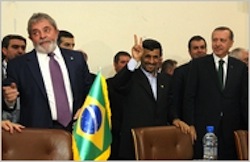Iran Could Resume Talks by Late August
June 30, 2010
Featured Image
Today's top nuclear policy stories, with excerpts in bullet form.
Stories we're following today, Wednesday, June 30, 2010:
Iran Says Nuclear Talks to Resume With Brazil, Turkey - Reuters [link]
- Iran said on Tuesday it would soon resume nuclear talks with Turkey and Brazil -- a tentative first step back to international negotiations after Tehran was hit with a new wave of sanctions over its disputed nuclear work.
- President Mahmoud Ahmadinejad said on Monday he would return to long-frozen talks with world powers but on certain conditions only, and not before the end of August.
- His foreign minister said talks would start before then with the two countries with which it agreed a nuclear fuel swap deal in May.
- Ahmadinejad has called on the major powers to "clarify" three things before talks could resume: their attitude to Israel's alleged nuclear arsenal, their stance on commitments to the nuclear Non-Proliferation Treaty and whether they come to the table as Iran's friend or its enemy.
State Department Downplays Spy Case's Possible Fallout - The Associated Press [link]
- The scandal over an alleged Russian spy ring erupted at an awkward time for a White House that has staked its foreign policy record on improved cooperation with Moscow, but it appeared unlikely to do lasting damage to U.S.-Russian relations.
- Officials in both countries left the impression that spy rings remain a common way of doing business.
- Obama wants to build the foundation for a strategic partnership with Moscow — to increase security and economic and other cooperation with the former Cold War foe.
- The full dimensions of the case are yet to be made public, but the charges against the 11 suspects do not include espionage, and it was unclear what — if any — U.S. government secrets they managed to collect or transmit to Moscow.
Benefits of US-Russian Missile Defense Cooperation - Volha Charnysh for the Nukes of Hazard Blog [link]
- Last week, prior to his meeting with Russian president Dmitry Medvedev, Barack Obama was quoted as saying that “cooperative missile defense with Russia has enormous potential”.
- The idea of U.S.-Russian missile defense cooperation is not new, and the initiatives considered today have been pondered for decades.
- U.S. proposals for missile defense cooperation with Russia include integration of U.S. and Russian sensors; joint research and development; joint missile defense testing; joint modeling and simulations; missile defense exercises; and joint analyses of alternative U.S.-Russian missile defense architectures for defending against common, regional threats.
- I argue that missile defense collaboration with Moscow would not only help to reduce Russia’s concerns regarding U.S. missile defense plans, but also provide Washington with additional technology and expertise, send a stronger message to regimes developing ballistic missile capabilities, improve the U.S.-Russian bilateral relationship, and open possibilities for further arms reductions.
Another Tea Party Enigma: Foreign Policy - USA Today [link]
- It's hard to find any coherent foreign policy emerging from the political slogans shouted at "Tea Party" rallies.
- Yet what's most remarkable is that more questions on national security and foreign policy are not being asked of the movement's supporters, much less its candidates, who could wield significant leverage on U.S. policies abroad if they're elected in November.
- There are realists and internationalists, non-interventionists and neo-conservatives, hawks and doves within its disparate ranks — but the biggest bloc appears to be undecideds.
- Whatever their leanings, if more Tea Party loyalists enter Congress, expect U.S. foreign policy to change in subtle ways.
- In his new national security strategy, President Obama genuflects to globalism and multilateralism, both of which are anathema to most Tea Partiers.
A View from the Dark Side
The Boris and Natasha Show - The Wall Street Journal [link]
- The FBI on Monday arrested 11 members of a spy ring that used assumed identities to integrate themselves into American life.
- It's tempting to laugh off this episode as Russian keystone spies, but don't forget that paramount leader Vladimir Putin is a former KGB colonel who made the revival of his country's security services a priority.
- The timing was also embarrassing for President Obama, who only four days earlier hosted his "friend and partner" Dmitry Medvedev, the Russian president, for a "cheeseburger summit" in Washington as part of the Administration's "reset" in relations with Russia.
- In truth, Russia doesn't see this relationship the way Mr. Obama does.
- We can and should seek good relations with Russia. But while Mr. Obama sits down for cheeseburgers, the people who really run the Kremlin still consider the U.S. a serious rival for power and influence, and stealing America's secrets is standard Putin procedure.



